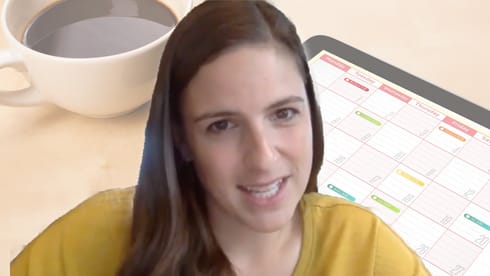
Homeschool Advice: Don’t Expect What You Don’t Inspect
Some education principles are broad and deep with numerous applications. Intelligent people write volumes on them and we, the average homeschool mom, read and reread, slowly coming to a better understanding.
Other education principles are simple, straightforward, and common sense. Yet, that doesn’t seem to make them easier to apply. It just makes me stupid when I don’t.
Today’s piece of homeschool advice is one such principle, told to me multiple times by multiple older moms and confirmed by my own experience as a homeschooled kid.
And yet.
That doesn’t seem to help the application front. It’s still hard. I still choose to believe in exceptions. I still get lazy. And then I pay – and so do my kids.
So, I’m passing this piece of homeschool advice on to you not so you can homeschool like me, but so that I can reinforce to myself – by the writing process – how foundation and essential this principle is.
I don’t want you to be like me. I want you to join me in breathing deeply, taking responsibility, and digging in to do the right thing.
Homeschool Advice Given
It was one of the first homeschool socials at my house, nine or so years ago. I had invited not only young moms, my peers, just starting out or only considering homeschooling, but also one or two older moms who’d been homeschooling for decades and graduated multiple students. Some had even finished their homeschool marathon.
I asked them to share their best piece of advice for those of us just beginning to homeschool.
And the answer deflated me – because I knew it was true and I didn’t want it to be.
She said: “Never expect what you don’t inspect.”
If you, as the homeschool parent, are not putting eyes or ears on the work being done, it likely is not being done – at the best, it is not being done well.
Homeschool Advice Confirmed
You don’t get out of this with good kids, either. I know, because I was one, and I prove the necessity of this piece of advice.
I was in middle school and early high school, self-correcting my math with the directive to ask Dad in the evenings if I had any questions.
I never had any questions that compelled me to bring up the subject of math after dinner – perish the thought!
No, my goal was to be done by lunch.
So, if I put in an hour on my math lesson, I was “done.” I had done my math. Who would expect anyone to do more than an hour? That would be unreasonable, tyrannical.
So, I did my lesson-a-day routine – getting as far as I got in an hour, sometimes checking, sometimes not, but never really caring whether or not I did get them right or wrong.
Suddenly, I was half-way through the Algebra II book and had no idea what was going on.
PS – my mom at this time had twin toddler boys and was pregnant. I not only looked responsible, I lobbied for independence. I was the oldest and my mom was a homeschool trailblazer.
As was the mother of my friend who offered the advice of inspecting what you expect. She, too, had learned the hard way.
Homeschool Advice Unheeded
So, I really have no excuse. I am no trailblazer. I stand on the shoulders of those who have gone before. I have been the responsible-looking, self-deceived deceiver. I know accountability is vital.
Yet, I have had also to learn this lesson the hard way, more than once – even more than once per student.
I assume things are chugging along. I am checking for awhile, things are good, so I slack off. Then, it turns out, I’m not the only one slacking off.
Sometimes I just turn my head and don’t want to look because I don’t want to deal with it. Eventually, however, it must be dealt with. And clearly it has not been only the student who was not doing what he ought. I, too, was not doing what I ought.
Sometimes life is busy and I forget or genuinely don’t have time. And so how do I respond when I do go looking, find undone work, and the child says, “Oh, I forgot.” or “I didn’t have time!”? It started with me.
When (not if) this happens, we as the parents have to take responsibility and not pass the blame. We can’t expect more maturity and more follow-through than we ourselves have. However, we must also remember that the goal of education is virtue (the goal, not the prerequisite) and that these experiences are our character training program.
The Moral of These Homeschool Advice Stories
We cannot expect our students to care about their work if we do not care. We show care by paying attention, by listening, by looking, by commenting, by holding them to a standard of good work.
By inspecting with cheerful yet consistent grace, we are modeling responsibility and providing accountability. Better to do less work, well and consistently, than a lot of work hit-and-miss.
We have a tendency to make the checklist and then think our responsibility is over and now it is theirs. Because there is a checklist, they now have no excuse – and that is true, but they will still attempt excuse. How we teach them through those moments is just as important a part of their education as the math page.
We need to remember their frame, just as God remembers ours. They need support. Support is not just ra-ra cheering. Support is like a tomato cage: it holds up and keeps them from falling over, because surely they will fall over if left to themselves.
Our students are the tomato plants. The tasks on the checklist are the fruit. They can’t bear the weight of their work themselves. The more prolific and vigorous the plant, the more support is required. The bigger the tomato, the more likely they are to fall to the ground where bugs will eat the smashed fruit. Our attention, direction, inspection, and conversation are the rungs of the tomato cage that keeps the plant upright, productive, and robust.
It’s our job, and God Himself is our support, supplying all we need to fulfill the calling and responsibility He’s given us.

Get 5 of my favorite homeschool checklist templates!
Jumpstart your homeschool checklist practice by starting with one of my proven formats. Open, edit, and make them your own! Plus, get tips and followup, too –





